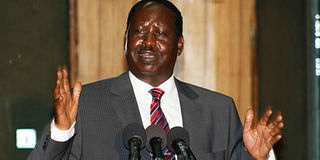I am ready to face the ICC, declares Raila

Prime Minister Raila Odinga addresses a past press conference. Mr Odinga said he had no problem explaining to the ICC whatever it wanted to know about the post-election violence. Photo/FILE
What you need to know:
- Premier backs local tribunal, but says he is ready if called by international court
Prime Minister Raila Odinga has declared that he is ready to face the International Criminal Court as debate on where poll chaos architects should be tried heightened.
Speaking in London, on his way home from Germany, Mr Odinga said he had no problem explaining to the ICC whatever it wanted to know.
“We have not been involved in any kind of criminal activity. We want to put these things behind us. There’s too much speculation,” Mr Odinga told NTV in an interview.
Mr Odinga and President Kibaki have been pushing for a special local tribunal to try the suspects as recommended by the Waki report.
But Parliament has already shot down a Bill that would have seen the establishment of the tribunal. If other attempts to have a local tribunal fail, then the secret list of key suspects will be forwarded to the ICC for action.
On Sunday, our sister paper, the Sunday Nation, reported that even if President Kibaki and Mr Odinga are not on the list of suspects, the ICC could still call them to account for atrocities committed during the post-election violence.
The ICC chief prosecutor, Mr Luis Moreno-Ocampo, could task the two leaders to explain what they knew about the violence that left more than 1,300 people dead and more than 600,000 displaced, and what they did to stop it.
This would be under the principle that those in position of ultimate authority bear responsibility for the actions of their juniors.
The majority of MPs from both sides of the political divide, including some key Cabinet ministers such as Mr William Ruto, have publicly voiced opposition to a local tribunal and instead proposed that the suspects be tried at The Hague.
The MPs argue that local trials would be subject to manipulation.
The ICC law, to which Kenya is a signatory, states: “A superior shall be criminally responsible for crimes within the jurisdiction of the court committed by subordinates under his or her effective authority and control, as a result of his or her failure to exercise control properly over such subordinates.”
It is this law that attracted attention from some countries at the African Union Heads of State summit last week. African leaders were annoyed by the warrant of arrest issued by the ICC against Sudanese President Omar al-Bashir.
On Tuesday, Mr Odinga, who spoke to NTV reporter Joe Ageyo, also discounted reports that Kenya had been given an extension to establish a local tribunal.
He said the Kenyan Government has a responsibility to deal with post-election violence issues, adding that “if we do not move forward the ICC will come in”.
The PM said if the government does not deal with the issues, the ICC will come in without reference to time limit.
Last Friday, it was reported that the ICC prosecutor gave Kenya 12 months to set up a special tribunal, saying his was a court of last resort.
A statement released after a meeting of Kenyan ministers and Mr Moreno-Ocampo said: “If there is no parliamentary agreement, and in accordance with the Kenya Government’s commitment to end impunity of those responsible for the most serious crimes, the Government of Kenya will refer the situation to the prosecutor in accordance with Article 14 of the Rome Statute.”
On Tuesday, Imenti Central MP Gitobu Imanyara criticised an agreement between the government and Mr Moreno-Ocampo that instead of the envisaged special tribunal, suspects could be subjected to the Truth, Justice and Reconciliation Commission or tried by a special division of the High Court.
Mr Imanyara said MPs will oppose the move. “The government had an opportunity at an early stage but rejected it. It is too late for it to now seek an alternative,” he said.
Mr Imanyara said MPs wanted the perpetrators to be tried at ICC because the option was contained in the Waki report.
He said the government rejected proposals for the establishment tribunals modelled on the Sierra Leone and Arusha-based Rwanda tribunals.
Mr Imanyara cited the rot in the judiciary and arrests of wrong people following the Kiambaa killings as a sign that Kenya was not ready to try the suspects locally.
Separately, Gachoka MP Mutava Musyimi said Parliament was not the sole repository of wisdom and called for broad consultations to agree on where the suspects should be tried.
“While discussion must take place among political leaders, there is value in consulting other sectors of society and tapping into their experience and wisdom,” he said and called on the parliamentary committee on legal affairs to lead the process.
He said voting for the defeated special tribunal Bill in February was done before consultations.
However, German ambassador Walter Lindner supported the local tribunal. He said the process will not be manipulated as the international community will be involved.
According to the International Centre for Policy and Conflict (ICPC) executive director Ndung’u Wainaina, the government is unwilling or unable to bring to justice perpetrators of post-election violence to eradicate widespread impunity.
Last minute
The government, he said, had six months after the defeat of the special tribunal Bill to hold meaningful consultations and come up with a new legal framework for a credible tribunal.
“Instead of doing so, it has waited until the last minute to seek extension of time allocated to enact the tribunal.”
“We urge Mr Annan and the ICC to send a strong message to the government that impunity will not be tolerated,” he said.




